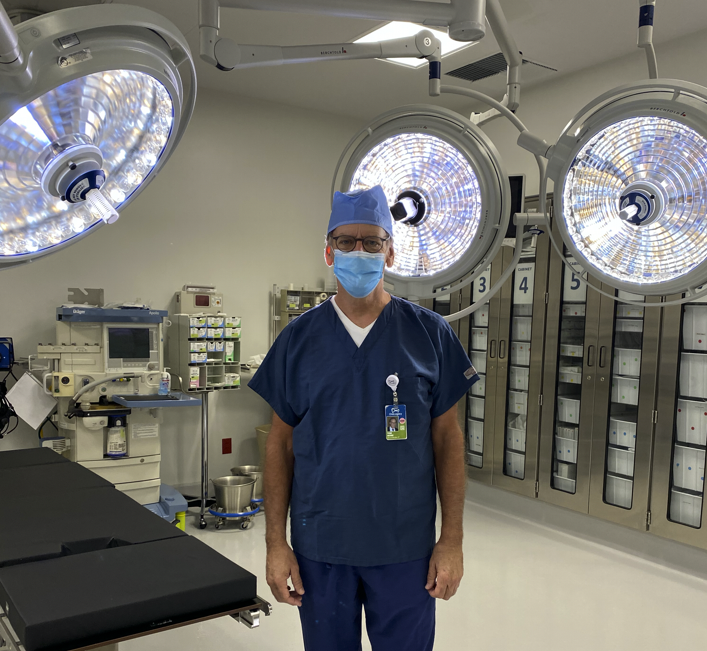
Indeed, organ donations dipped in March as the lockdown took hold. That’s when Mone, who is chief executive of OneLegacy, the downtown-based nonprofit that is the largest organ and tissue procurement organization in the nation, stepped up efforts to win over potential donors.
“Due to Covid restrictions, we couldn’t meet with family members in the usual settings,” Mone said. “Instead, we were meeting with them in parking lots, reassuring them that Covid testing and other precautions were being taken.”
Those meetings paid off. By May, OneLegacy’s organ procurements not only recovered to prepandemic levels, but actually exceeded them.
“People really stepped up,” Mone said. “We started seeing some of our highest ever authorization rates for organ donations — upwards of 75% instead of the usual 67%.”
Organ donations have continued to run ahead of last year’s pace, putting OneLegacy on track to exceed 2019’s total of about 1,600 organs donated.
The nonprofit charges a cost-recovery fee averaging about $50,000 for each organ donated and transplanted. The fees are paid by hospital organ transplant centers, which get reimbursements from Medicare or from insurance companies for patients ineligible for Medicare.
(Organ procurement organizati
In most cases, organs can only be recovered from patients who are on life support and who, either themselves or through their families, authorize the donation of their organs. Once authorization is given, an average of three organs is extracted from each patient.
The situation is different for kidneys and other organs that can be donated by living patients. In those instances, only a single organ is extracted.
Organs are then matched with patients on transplant wait lists,
Then the organs are rushed to authorized tra
Emerging dominance
The Covid-19 pandemic is only the most recent hurdle that OneLegacy has faced in the 43 years since the nonprofit launched shortly after the dawn of the organ transplant era.
In 1977, the region’s only organ procurement center was run out of UCLA Medical Center and was unable to meet the burgeoning demand for organ transplants, especially kidneys.
Two doctors, twin brothers Robert and Rafael Mendez, who together headed the kidney transplant program at St. Vincent Medical Center in Westlake, saw this shortcoming and decided to open a rival nonprofit agency, known as Southern California Organ Procurement and Preservation Center, to procure kidneys at hospitals not served by the UCLA agency.
In 1984, the organ procurement world changed when Congress passed the National Organ Transplant Act, which was authored by then-Sens. Al Gore and Orrin Hatch.
The law banned the for-profit sale of organs for transplantation and required all organ procurement agencies to obtain licenses from the Department of Health and Human Services, which oversees the Medicare program.
In the 1990s, organ donation rates fell, and stricter oversight standards came into effect, putting pressure on organ procurement agencies. The UCLA organ procurement center was forced to close, and its business operations were folded into the Southern California Organ Procurement and Preservation Center.
That expanded organization became the sole procurement agency for all of Southern California, except for San Diego and Imperial counties. It also became the largest of the nation’s 58 organ procurement agencies, both in population served and organs procured.
Mone was brought on to manage this transition in 2000. In 2001, the agency was renamed OneLegacy.
Mone said his primary goal has been to spend more time up front with the families of potential organ donors, convincing them to donate the organs of family members on life support.
“That’s why we rebranded the organization OneLegacy, to focus more on the legacy that the organ donor leaves and less on the act of organ procurement,” he said.
The Affordable Care Act, which boosted the number of recipients with health insurance, has helped increase donations. OneLegacy last year procured organs from 557 donors.
Covid testing challenge
When the Covid-19 pandemic hit in March, OneLegacy faced another hurdle: the need to coordinate testing of both donors and recipients to reduce the risk of coronavirus transmission from the transplant procedure.
“When a donor becomes available, we don’t have several days to wait for Covid test results before the organs can be procured — we have only five or six hours,” said Jon Kobashigawa, director of the heart transplant program at Cedars-Sinai Medical Center in Beverly Grove.
“The last thing we want to do is transplant a Covid-infected organ. So that means we need rapid testing, which was very hard to get in April and May. OneLegacy came through for us on the testing front, which probably helped save lives,” he added.
The matched organ recipient also needs to be tested — and the tests need to be coordinated so that they are both completed within the narrow transplant time window, said Wendy Escobedo, director of nursing for dialysis and transplantation at St. Joseph Hospital in Orange. The hospital is part of the Renton, Wash.-based Providence Health & Services hospital network.
OneLegacy, she said, has “done a very good job coordinating the transplants so everything goes smoothly, like clockwork.”
Escobedo, who chairs OneLegacy’s committee of organ transplant administrators, said she is pleased that OneLegacy has been able to keep organ procurement rates high despite the pandemic.
“I’m satisfied that they are doing everything possible to ensure that as many people as possible donate organs,” she said.
